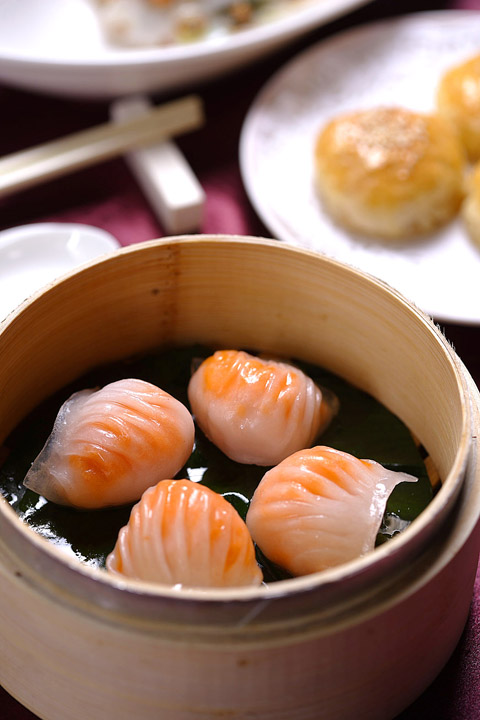It is surprisingly difficult to get really good Cantonese food in Taipei, and the Grand Formosa Regent is attempting to step into the breach with the creation of its new Silks House (晶華軒) restaurant, which opened last month. It's taking over the premises of the Lan Ting (蘭亭) Shanghainese restaurant with very little modification to Hashimoto Yukie's calligraphy-inspired decor. The food, on the other hand, has made a considerable transition under the guidance of chef Wu Hong-chen (伍洪成), who's gained an international reputation as the chef of presidents, having been for many years the executive chef of choice to preside over state banquets.
One of Silks House's main attractions is the "dim sum" menu, those delightful Cantonese snacks most often served in a steaming basket and designed to be eaten with tea. These snacks can be coupled with one or two main dishes to make a meal that does not break the bank. For more lavish dinning, Silks House is not short of spectacular banquet dishes, either. Wu is renowned for his research into Cantonese cuisine's classic dishes and has added a number of rarely seen specialties to the menu.
Silks offers a wide range of high-quality teas priced between NT$60 and NT$120 per person, from the usual jasmine and pu'er to exotic, high-end brews for connoisseurs. The snacks, which range in price from NT$90 chicken's feet, in this instance jazzed up with XO sauce, to NT$280 for baked egg tarts with bird's nest (燕窩烤蛋塔). Silks has made a concerted effort to make its snacks exotic with the addition of high-priced ingredients, and while this works in some cases - the pan-fried turnip cake with dried scallop (瑤柱蘿蔔糕, NT$100) is refreshingly light and the scallops give it a really surprising taste - in other cases, as with the egg tarts, the benefits were negligible.

PHOTO COURTESY OF GRAND FORMOSA REGENT
Main dishes start at around NT$400 and feature a mixture of traditional favorites excellently made, such as stir-fried grouper with yellow chives (韭黃炒龍膽魚球, NT$480), to variations of tradition such as the roast duck Grand Formosa style (晶華片皮鴨, NT$2,000), which is sliced at table, served with unique oat pancakes, wrapped with an unusual mixture of sweet peppers and young ginger, and includes a soup made from the bones of the duck.
There is more than enough variety to keep even the most ardent foodie busy. The Silks brand will also be expanding, with the new Silks Palace scheduled to open in the grounds of the National Palace Museum mid-May.

US President Donald Trump may have hoped for an impromptu talk with his old friend Kim Jong-un during a recent trip to Asia, but analysts say the increasingly emboldened North Korean despot had few good reasons to join the photo-op. Trump sent repeated overtures to Kim during his barnstorming tour of Asia, saying he was “100 percent” open to a meeting and even bucking decades of US policy by conceding that North Korea was “sort of a nuclear power.” But Pyongyang kept mum on the invitation, instead firing off missiles and sending its foreign minister to Russia and Belarus, with whom it

When Taiwan was battered by storms this summer, the only crumb of comfort I could take was knowing that some advice I’d drafted several weeks earlier had been correct. Regarding the Southern Cross-Island Highway (南橫公路), a spectacular high-elevation route connecting Taiwan’s southwest with the country’s southeast, I’d written: “The precarious existence of this road cannot be overstated; those hoping to drive or ride all the way across should have a backup plan.” As this article was going to press, the middle section of the highway, between Meishankou (梅山口) in Kaohsiung and Siangyang (向陽) in Taitung County, was still closed to outsiders

President William Lai (賴清德) has championed Taiwan as an “AI Island” — an artificial intelligence (AI) hub powering the global tech economy. But without major shifts in talent, funding and strategic direction, this vision risks becoming a static fortress: indispensable, yet immobile and vulnerable. It’s time to reframe Taiwan’s ambition. Time to move from a resource-rich AI island to an AI Armada. Why change metaphors? Because choosing the right metaphor shapes both understanding and strategy. The “AI Island” frames our national ambition as a static fortress that, while valuable, is still vulnerable and reactive. Shifting our metaphor to an “AI Armada”

The Chinese Communist Party (CCP) has a dystopian, radical and dangerous conception of itself. Few are aware of this very fundamental difference between how they view power and how the rest of the world does. Even those of us who have lived in China sometimes fall back into the trap of viewing it through the lens of the power relationships common throughout the rest of the world, instead of understanding the CCP as it conceives of itself. Broadly speaking, the concepts of the people, race, culture, civilization, nation, government and religion are separate, though often overlapping and intertwined. A government